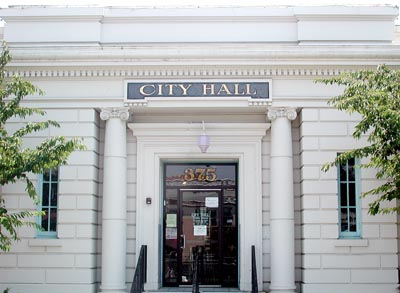Both sides of the Measure E sales tax argument pointed to its potential impact on economic development. Proponents contended that with fewer resources, it would drive away new businesses. The most vocal opponent argued that a lower sales tax would benefit small businesses, and that the city should get out of the economic development business altogether.
For voters on Nov. 6, as was the case at this week’s forum hosted by several business groups, it will come down to perception. There is no clear answer – if the economy is the driving force in the decision – what the impact might be.
Local resident Mark Paxton, one of the speaking panelists in favor of the 1 percent tax, called the alternative “unacceptable.” He was referring to the “austerity plan” approved by council members last year that would include many layoffs, particularly in public safety departments making up about two-thirds of the general fund budget.
“I would argue that public safety, decent streets, vital communities with well-maintained, attractive parks,” Paxton said, “that all of that constitutes an appropriate role for cities and counties in the area of economic development.”
Measure E opponent Tod duBois, though, said he had talked with “numerous small businesses” that are against the tax but won’t speak out because they fear retaliation from the city.
“It really should be called the $500 a year family tax,” duBois said. “Because that’s the kind of impact an average Hollister family is going to pay, $500 a year.”
Considering there are about 10,000 households in Hollister – and that outside shoppers contribute to the $3.2 annual amount raised from the sales tax – that number is actually somewhere below $320 annually for the average household.
The proposed tax would raise more than $3 million annually. It would be a five-year extension to the Measure T sales tax approved in November 2007. At the time, proponents of the tax and city officials promoted the measure as a means to adding services. Without a significant service bump – and with $500,000 in raises given to Hollister employees months after the Measure T approval – duBois is among residents who remain skeptical about the extension.
He pointed to the city’s $100,000 loss from buying and selling T-shirts at the 2008 biker rally, along with the Measure T oversight committee that no longer meets and “ceased to exist.”
“We also need to make our leaders make the tough decisions,” he said.
One other resident, Oscar Rivera, spoke against Measure E. The pro side had four other speaking panelists, including the former police chief and interim police chief; a retired city worker; and the San Benito County Business Council executive director, Kristina Chavez Wyatt, who listed off future contingencies – such as putting together a comprehensive economic development plan – for the group’s support.
Retired Police Chief Jeff Miller, meanwhile, deflected blame away from city officials for Hollister’s financial problems and structural deficit, while noting how 11 California cities last June approved new taxes.
“If you want to attract business, you have to maintain services,” he said.
During a question-and-answer session, the two sides were asked about their feelings on gang activity. Interim Police Chief David Westrick said he was concerned about events in the past few weeks, which have included several gang-related arrests.
DuBois was upset about the timing of the police announcements.
“We are actually upset there’s been so much advertising of gang activity,” he said. “Claims of gang activity and threats of austerity really send the wrong message.”










